Live Reporting
- Prince Charles is working at his desk as usual today, according to palace officials, following the announcement yesterday that he had tested positive for coronavirus.However, a spokesman declined to give an update on the health status of the Prince of Wales, 71, who is at his Scottish home Birkhall in Aberdeenshire.The spokesman added that the heir to the throne had received hundreds of “get well soon” wishes sent to Clarence House – cards but mostly digital messages.
- With the country having just witnessed its third-highest one-day rise in deaths since the outbreak began - for a total of more than 7,500 - it is hard for Italians to see a glimmer of hope.And yet there are grounds for it: the rate of new infections has slowed again and the government-run national research council says almost half of all provinces have already hit the peak of the outbreak.But while the containment measures seem to be working in Lombardy, the worst-hit region in the north, poorer parts of central and southern Italy are seeing a worrying rise in deaths. The president of Campania, the region around Naples, warned of “the real prospect that Lombardy’s tragedy is about to become the south’s tragedy".Prime Minister Giuseppe Conte has promised a second package to ease the economic impact worth at least €25bn (£23bn), with the EU’s third-largest economy likely to plunge into its deepest recession in a generation.
- The first flight chartered by the UK government from Peru - carrying more than 200 stranded Britons - has arrived at Heathrow.Our diplomatic correspondent James Landale says some 1,000 Britons have registered with the UK embassy in Lima seeking to come home.UK Foreign Secretary Dominic Raab says more flights are likely "in the coming days" as negotiations continue with the Peruvian authorities.
- For those of us already living with anxiety concerns about the pandemic can make this an especially tough time.In this video, Anxiety UK's operations director David Smithson and three women with pre-existing anxiety disorders offer their advice for dealing with the condition during this time.We've also put together a guide on how to protect your mental health during the outbreak.
Video content
- The latest data from Spain shows the death toll has risen by 655 in the last 24 hours, bringing the total to 4,089 - slightly lower than Wednesday's rise of 738. Confirmed cases rose to 56,188.Madrid remains the worst affected area, with close to a third of cases. But Catalonia has also seen a steep rise, reporting 11,592 confirmed infections.Late last night Spain extended its national state of emergency until 12 April in a bid to halt the spread of the virus.
- As the crisis in the US accelerates, China says it has all but stopped the spread of the virus. Meanwhile countries in southern Europe report thousands of new cases daily.Our graphic shows how the course of the pandemic has changed.
- The World Health Organization has warned America could become the new epicentre for the pandemic after a "very large acceleration" in cases in recent days.New York is by far the state worst affected but infections stretch right across the country, as our graphic shows.
- Dozens of basketball hoops in the US city of New York are being taken down to curb the spread of the pandemic.Mayor Bill de Blasio said they would be removed at 80 public courts where people were not respecting social-distancing measures. These ask people not to shoot around with anyone who is not a member of their households.“There will not be any basketball games because there will not be any basketball hoops,” he said at a City Hall briefing on Wednesday evening.The new measure leaves some 1,700 other courts still available.On Wednesday, New York State Governor Andrew Cuomo said the city would ban basketball and other contact sports in public parks, Reuters news agency reports.As of Wednesday night, nearly 33,000 cases had been confirmed in New York, an increase of more than 7,000 from the day before, NBC reports. At least 366 people have died, it added.
- A UK charity has launched a £5m fund to help professional musicians who are struggling during the coronavirus crisis.Help Musicians says it set up the fund to help reduce the worry many musicians are experiencing about their mounting household expenses.The charity says musicians who are suffering "significant financial hardship" can apply for a one-off payment of £500 to alleviate some of their immediate money worries.
- Leaders are holding a video summit today as coronavirus continues to spread.Here are the latest developments from across the continent:
- All 27 member state leaders will discuss the EU’s response to the virus in the virtual summit this afternoon. There have been disagreements about how best to act, with some countries calling for joint “corona bonds” to revive European economies and others urging financial restraint
- The latest statistics on Spain’s outbreak are due out this morning. There are close to 50,000 confirmed cases in the country – including Deputy Prime Minister Carmen Calvo – and more than 3,600 deaths. El Pais newspaper reports that new rapid tests sent to the country by China don’t work well
- All restaurants, parks and shops barring grocery stores will shut in Moscow for one week on Monday, the city’s mayor said, as Russia ramps up its response to the outbreak. President Putin announced yesterday a week off work for Russians to limit the spread. And as of Friday, all flights to foreign countries will cease, except those bringing home citizens from abroad
- France has recorded 1,331 deaths. In a visit to a hospital last night President Emmanuel Macron said he would call on the army to help the country. A government spokeswoman said the 15-day lockdown measures could be extended, with a final decision expected “in the coming days”
- An 84-year-old man has become the first British prisoner to die after contracting coronavirus.The inmate at HMP Littlehey, in Cambridgeshire, died in hospital on Sunday. He reportedly had underlying health issues.As of Wednesday, 19 inmates had been diagnosed with the virus across 10 jails, while four prison staff had also tested positive.
- South Korea is getting tough on arrivals from overseas and demanding that they download a phone application to track potential symptoms of coronavirus or they will not be granted entry into the country.Foreigners will also have to abide by the 14-day self-quarantine rule or face deportation.The government is determined to try to keep its borders open but that comes with an element of risk.More than half of the reported 100 new Covid-19 cases on Thursday were from international arrivals. All those travelling from Europe are now being tested for coronavirus when they arrive at Incheon International Airport. Stricter entry procedures are also being applied to arrivals from the US.Even if travellers test negative for the virus, they must spend 14 days in isolation and use the application which is downloaded at the airport to record their symptoms. If they fail to use the app daily, the authorities will track them down.Prime Minister Chung Sye-kyun said there would be a zero-tolerance approach towards those who violated these terms of entry.Korean nationals could face legal action and foreigners will be expelled from the country.
- A 36-year-old man has been killed in a confrontation with FBI agents after allegedly planning to attack a hospital in Missouri with a vehicle bomb.Timothy Wilson was a "potentially violent extremist" with a record of expressing racial and religious hatred and anti-government sentiment, the FBI said.He considered several targets, including a school with a large population of black students, a synagogue and a mosque, NBC News reports, quoting FBI officials.He finally settled on a hospital to cause "maximum casualties", given "the current health crisis", the FBI said. He took "the necessary steps to acquire materials needed to build an explosive device".Wilson, who was armed, was fatally wounded when FBI agents tried to arrest him on Tuesday in the Missouri town of Belton as he arrived to pick up what he thought was a "vehicle-borne improvised explosive device". "There was no actual bomb," the FBI addedThe alleged bomb plotter was "apparently frustrated with local government action to stop the spread of coronavirus", according to NBC News.
- Our Seoul correspondent Laura Bicker has visited an intensive care unit in South Korea to find out what conditions are like for workers. Watch her report.
Video content
- You would've almost certainly heard by now that washing your hands is one of the most important and effective ways to keep the coronavirus at bay - but you shouldn't be doing just a quick rinse. Here's a quick video to explain the correct technique.
Video content
- India has just announced a $22.6bn (£19bn) bailout for the giant country’s poorest citizens to help tide them over during the Covid-19 outbreak."We don’t want anyone to remain hungry and we don’t want anyone to remain without money in their hands,” said Finance Minister Nirmala Sitharaman.She said the package would take care of “those who need immediate help” and would include food security by providing free rice, wheat and pulses, as well as direct cash transfers.The government would also provide medical insurance cover of up to $66,482 for all healthcare workers helping fight the virus.India’s economy was in the midst of a brutal slowdown before the country went into lockdown, shutting workplaces, factories and leaving millions of day-wagers and informal workers anxious and helpless.So far India has recorded a tiny number of deaths and infections in proportion to its size - 13 deaths and 593 cases - but there are fears the virus will spread.
- Pictures of empty shelves across UK supermarkets sparked concerns about food shortages.Major supermarkets say they can cope and that shopping patterns should return to normal eventually - after all, there's only so much people can stockpile.But the pandemic has highlighted problems with food supply chains, which our modern societies entirely depend upon.For one thing, around half the food consumed in Britain comes from overseas, according to official figures. Supermarkets do not hold large reserves of food in the UK either - a measure in place to cut warehousing costs.Because of this, keeping supply chains running has become essential to putting food on the table. But how robust are these chains and what systems are in place to keep them working? Read more from Jonty Bloom at BBC Business
- A UK woman with brain cancer has had her chemotherapy stopped after being told her hospital was already at full capacity.Nancy Carter-Bradley said she was dealing with "unbelievable stress" ever since she was told her treatment at Charing Cross Hospital would be paused."To have my treatment stopped without doubt is going to shorten my life span. I don't know to what degree," she said.The Imperial College Healthcare NHS trust said it was "exploring the use of private healthcare facilities".
- The WHO has called on all countries to "test, test, test".So why isn't the UK testing more people?It basically comes down to resources. At the moment, the UK doesn't have the capacity to do mass testing - so healthcare systems have to start prioritising.The government's chief medical officer says the UK is trying to buy more testing kits but points to a current global bottleneck on buying more kits.
- France has recorded 1,331 deaths amid the coronavirus outbreak but there are fears the toll could be far higher.Health authorities are only counting those who die in hospitals and are not performing post-mortems on unconfirmed cases. France's top health official, Jérôme Salomon, said hospital cases "probably represent a small part of the overall mortality".News reports suggest nursing homes could be suffering a large number of deaths not included in the figures. The president of the Association of Directors for the Elderly told Ouest France newspaper 100,000 residents could be at risk and asked for government aid.



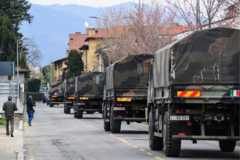


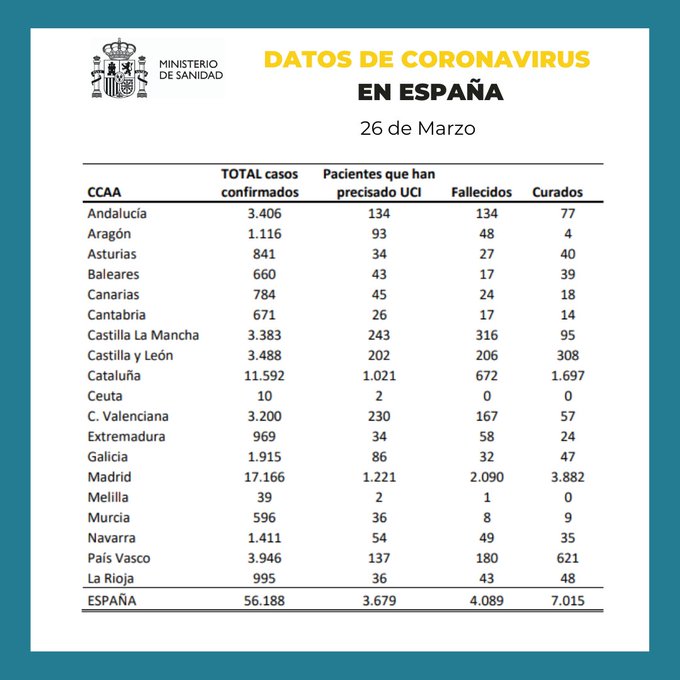
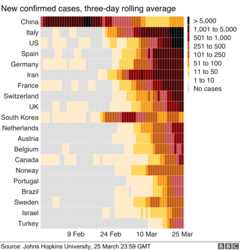
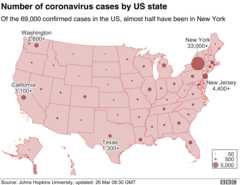
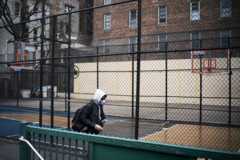

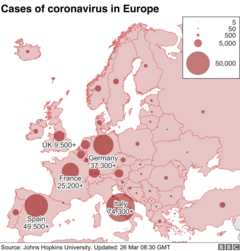

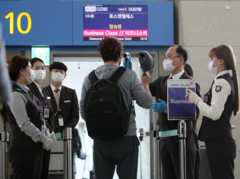

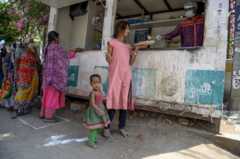


No comments:
Post a Comment